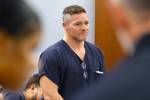It’s time to value the rest of life
I looked across the dance floor and for a moment they were there. Doing the jitterbug. Laughing.
New Year’s Eve 2012.
What I saw in my mind’s eye from my teenage years —- my parents enjoying themselves —- brought home an unpleasant reality yet again.
This year, 2013, will be my first with neither of them alive.
My death seems so much closer now. No longer is there a generation between me and it, a hurdle has been removed.
How strange it feels to become an orphan in my sixth decade of life. When mother died last year, she was the last person who knew firsthand that: I fell off my first bike the first time I rode it and broke my arm in three places; she needed to give me emergency dance lessons before the ninth-grade prom; I never thought I’d make it back from ‘Nam.
I knew, of course, this time was coming. My father, a World War II veteran, died a decade ago following a bout with cardiovascular disease. After mother came down with Alzheimer’s in 2010, I watched her die twice. First the mind, then the body.
Twice after my father died I tried to call him on the phone for some advice on pieces I was writing. Since my mother passed, I’ve found routine busy work more difficult to complete than a major series on Alzheimer’s. Filling out mileage expense forms, for example, became impossible. The mind is so strange.
While Dr. Therese Rando notes in her book, “How to Go On Living When Someone You Love Dies,” that a parent’s death is the most common form of bereavement for adults and not considered by society a “high grief loss” —- unlike the death of a child it is consistent with the laws of nature —- she also points out that losing “direct links to our past and to unremembered parts of ourselves” heightens feelings of grief.
Be that as it may, shortly after I saw my parents dancing the other night, I made a New Year’s resolution: I would live in such a way as to try and fight off death longer than they did.
Up until their later years, the way my parents lived set an example to follow: Hard work, do unto others as you would have them do unto you, don’t live outside your means, love one another, eat and drink in moderation.
Their mistake was buying into what had long been pushed as part of the American Dream —- a laid-back retirement, where lounging around with a TV remote is considered “the good life.”
Neither had a significant health problem until they lived “the good life.”
Dr. Jeffrey Cummings, director of the Cleveland Clinic Lou Ruvo Center for Brain Health, says research now shows that when it comes to the mind, “it’s use or lose it.” Becoming a passive couch potato is dangerous to your health, only serving to make it more likely that those over 60 will become one of the more than 5 million people with Alzheimer’s disease in the United States.
“We’ve learned the more active people are in later years, the less likely they are to be cognitively impaired,” Cummings said.
Inactivity —- read that watching TV —- is also a primary risk factor for cardiovascular disease, the leading cause of death and disability in the United States. Every year, about 2 million people in the United States have a heart attack or stroke, with 800,000 dying. Those who survive for a while, like my father, often live out their lives with severe disability and decreased quality of life.
So now I do what I’ll do from here on out: Walk my hour a day, do strength exercises and try to use my head as something other than a hat rack. Maybe I’ll get more than their 75 quality years.
And from time to time I suspect I’ll see my parents when they were enjoying life and each other. Doing the jitterbug. Laughing. Active.
Paul Harasim is the medical reporter for the Las Vegas Review-Journal. His column appears Mondays. Harasim can be reached at pharasim@reviewjournal.com or 702-387-2908.


















